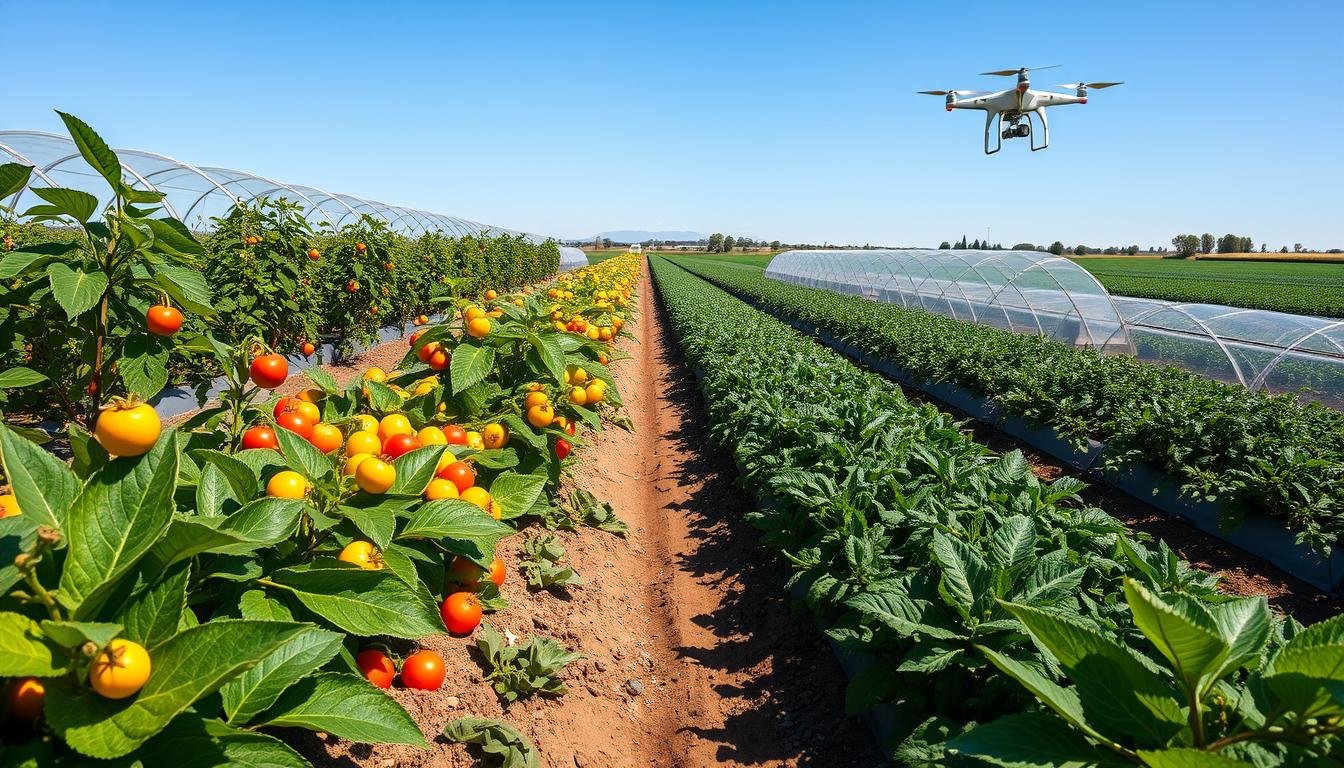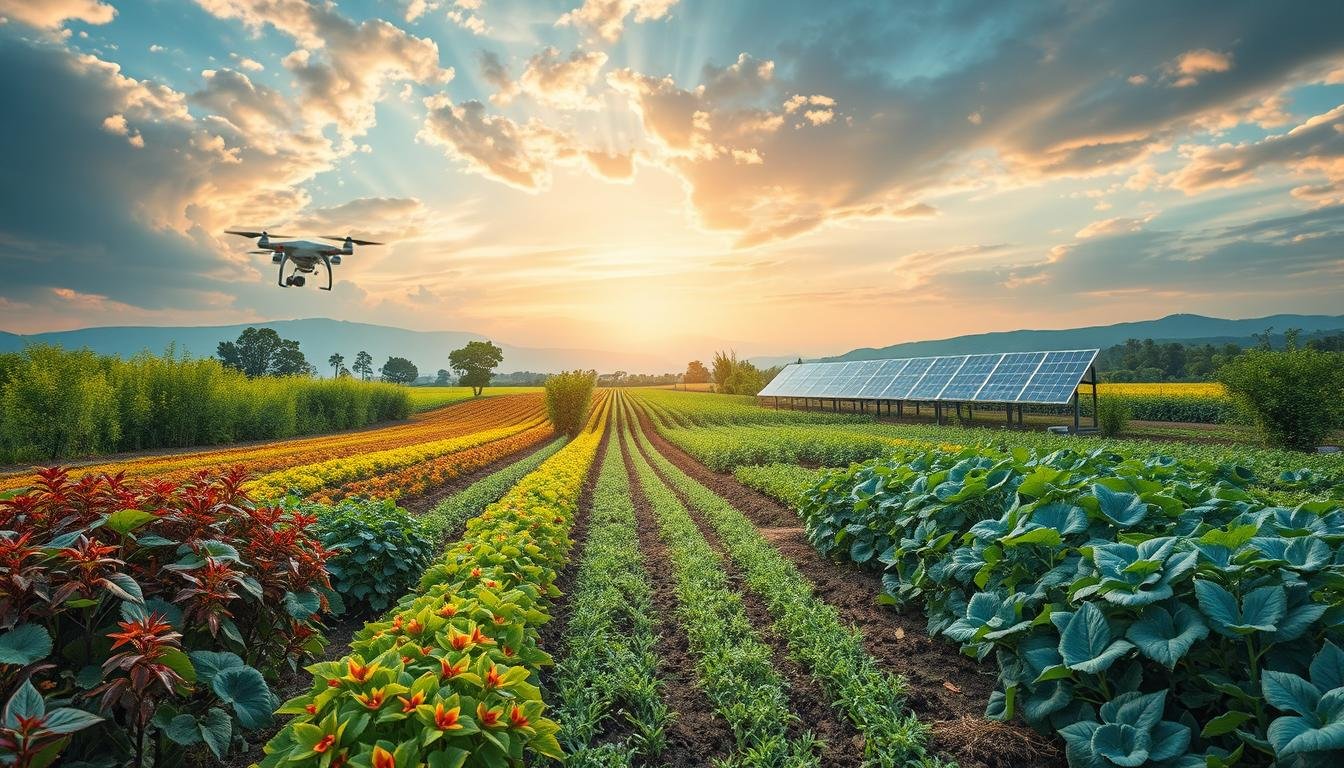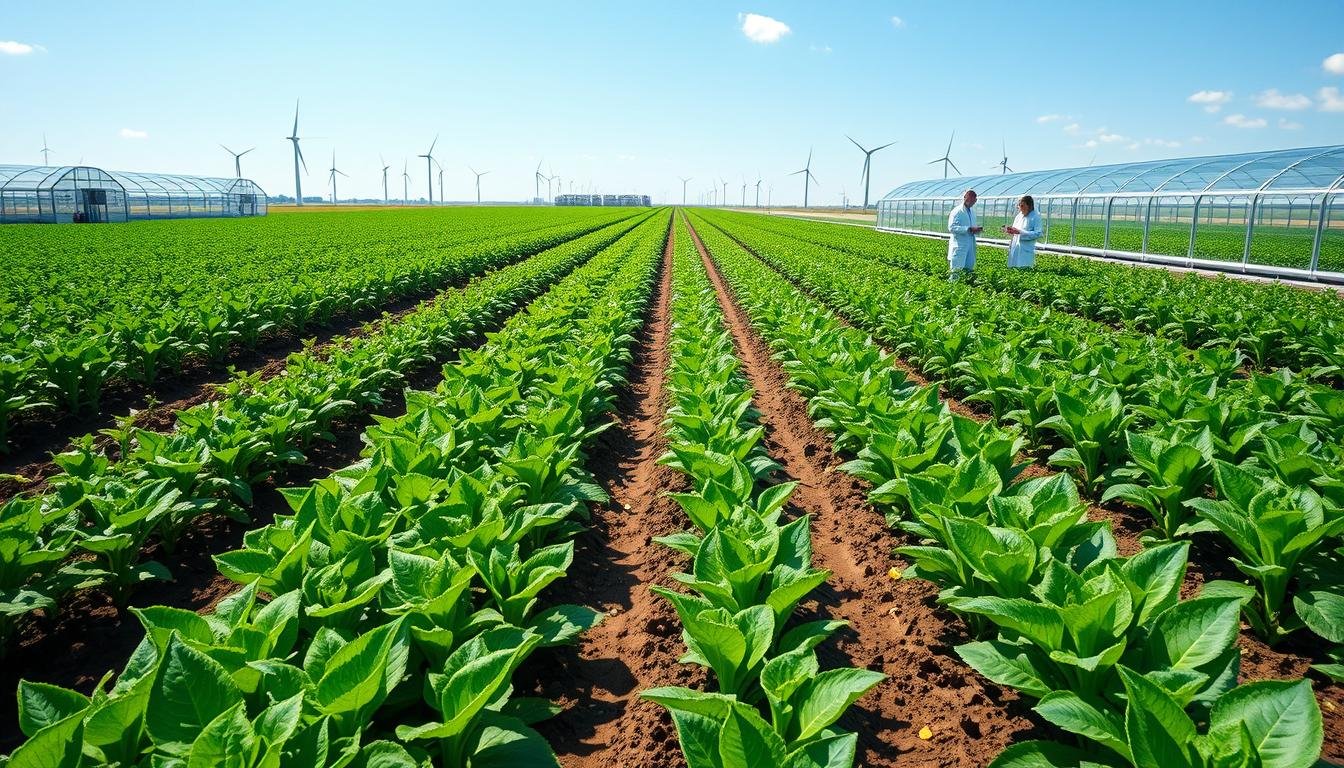Biotechnology is changing the game in agriculture and food production. It uses advanced tools like genetic engineering and molecular biology. These tools help grow more food, make it healthier, and make farming better for the planet.
Biotechnology has already made a big difference. Farmers use less pesticides, and crops can fight off diseases better. It also helps crops survive in tough weather conditions.
Biotechnology is also opening up new areas like making biofuels and plant-based medicines. As the world’s population grows, biotechnology will be key in solving food and health issues. It’s making food better and more available for everyone.
Key Takeaways
- Biotechnology uses advanced tools to make farming better and more sustainable.
- It has led to less pesticide use, stronger crops, and crops that can handle tough weather.
- Biotechnology is creating new chances for biofuels, medicines, and safer food, tackling global food and health problems.
- Regulatory bodies carefully check new biotech products for safety, looking at environmental and health risks.
- Biotechnology is crucial in meeting the world’s growing food needs while protecting the environment.
What is Agricultural Biotechnology?
Agricultural biotechnology uses tools and techniques to change living things for better farming. It includes old ways like breeding and new ones like genetic engineering. These methods help grow better crops and make new biotechnology products.
Defining Biotechnology in Agriculture
Biotechnology in farming uses the tiny parts of living things to create new technologies and products. It uses microorganisms and recombinant DNA to change plants, animals, and microbial systems.
Tools and Techniques in Agricultural Biotechnology
Some main tools and techniques in agricultural biotechnology are:
- Recombinant DNA technology: This lets us move genes between organisms to make new crops and animals.
- Genome editing: It’s a way to change DNA to add new traits or improve existing ones.
- Molecular biology: This field studies how living things work at the molecular level.
- Microbial fermentation: It uses microorganisms like yeast and bacteria to make important biotechnology products.
Thanks to these tools, we can now grow genetically engineered crops and improve plants and animals. We also make new biotechnology-based products for farming and food.
Applications of Biotechnology in Agriculture

Biotechnology has changed agriculture a lot. It has brought new ways to grow crops better and more sustainably. It also makes crops healthier for us to eat.
Genetically engineered crops are a big part of this change. They grow more, fight off pests better, and are more nutritious. For example, in 2012, 88 percent of the corn, 94 percent of the cotton, and 93 percent of the soybeans planted in the U.S. were varieties produced through genetic engineering.
Biotechnology also helps make new medicines and fuels from plants. This helps us stay healthy and use cleaner energy. It makes farming more efficient, too, by creating better antibiotics and vaccines.
It also makes farming greener. Biopesticides and biofertilizers reduce harm to the environment. Plus, it makes food safer and lasts longer.
New areas like bioinformatics and synthetic biology are opening up more chances. They help solve big problems in farming. This makes farming better and more innovative.
“Biotechnology has been instrumental in transforming agriculture, leading to significant improvements in crop productivity, sustainability, and nutritional value.”
Biotechnology and Climate Change

In the face of climate change, biotechnology in agriculture is key. It offers new ways to cut down greenhouse gas emissions. It also helps create climate-resilient crops and animals that can handle environmental stress better.
Mitigating Greenhouse Gas Emissions
Biotechnology brings solutions to lower greenhouse gas emissions in farming. For example, making biofuels from crops and microbes is a green alternative to fossil fuels. It cuts down the carbon footprint of farms. Also, making industrial processes more efficient with biotechnology leads to less greenhouse gas emissions.
Developing Climate-Resilient Crops and Animals
Biotechnology helps make crops and animals more resilient to climate change. Scientists use genetic engineering and genome editing to make crops like wheat and rice more drought-tolerant. They also work on making cattle more heat-tolerant. These efforts help farmers and producers adapt to climate change, ensuring a stable food system.
Recent advances in biotechnology show its potential in tackling climate change in farming. By using living organisms and biomolecular processes, biotechnology is key in reducing greenhouse gas emissions. It also helps develop the climate-resilient crops and animals needed to feed the growing population.
“Improved crops resilient to extreme environments caused by climate change are expected to be available in a few years to a decade to sustain food production for the growing population.”
Biotechnology and Food Security

As the world’s population grows, biotechnology is key to solving food security issues. It boosts agricultural productivity and improves crop quality. It also supports sustainable farming.
Genetic engineering is a major way biotechnology helps. It makes crops more resistant to pests and diseases. This increases yields and reduces losses.
For example, crops that can handle drought or extreme weather are vital. They help farmers grow food even when conditions are tough.
Biotechnology also makes food more nutritious. For instance, “golden rice” has more vitamin A. This helps fight nutrient deficiencies and improves health.
Moreover, biotechnology offers eco-friendly farming tools like biofertilizers and biopesticides. These reduce the need for harmful chemicals and protect the environment.
As we face the challenge of feeding more people, biotechnology is essential. It helps meet food demands while keeping our planet healthy.
| Statistic | Value |
|---|---|
| Developing countries’ share of biotech crop hectares in 2000 | 24% |
| Total biotech crop hectares in 2000 | 44.2 million |
| CGIAR centers’ annual budget for agricultural biotechnology research | $25-$35 million |
| Monsanto’s R&D budget in 1998 | $1.3 billion |
Biotechnology in agriculture could change how we produce and share food. It’s a big step towards global food security.
“Partnerships between public and private sectors are underway to facilitate access to biotechnology, with examples like Mexico receiving technology free of charge from Monsanto and collaboration with U.S. companies in Indonesia, Kenya, and Egypt.”
Also Read : How Does The Internet Of Things Work?
Conclusion
Biotechnology is changing agriculture and food production in big ways. It uses advanced tools like genetic engineering and recombinant DNA technology. These tools help grow more food, make it healthier, and farm more sustainably.
Biotechnology also helps fight climate change by creating biofuels and crops that can handle harsh weather. It’s making a big difference in the pharmaceutical and medical fields too. New diagnostics, vaccines, and gene therapies are improving human health.
The world’s population is growing, and so are the challenges of feeding everyone and protecting the environment. Biotechnology is key to solving these problems. It promises a brighter future for agriculture, industry, and health, benefiting millions of people around the globe.
FAQs
Q: What is the history of biotechnology and how has it influenced modern agriculture?
A: The history of biotechnology dates back thousands of years, with early practices such as fermentation and selective breeding. Modern biotechnology, however, emerged in the 20th century, driven by advancements in molecular biology and genetic engineering. This evolution has significantly impacted agriculture by introducing biotechnology applications that enhance crop yields, resistance to pests, and nutritional value.
Q: How does biotechnology involve the use of biological processes in agriculture?
A: Biotechnology involves using biological processes to manipulate living organisms or their components for agricultural purposes. This includes techniques like genetic modification, where specific traits are introduced into crops to improve resilience against environmental stressors or pests, ultimately leading to more sustainable food production.
Q: What role do biotech companies play in the agricultural biotechnology industry?
A: Biotech companies are pivotal in the biotechnology industry, as they conduct research and development to create innovative biotechnology products. These firms focus on developing genetically engineered crops, bioengineered food products, and sustainable agricultural practices that can meet the growing global food demand.
Q: What are some common biotechnology applications that have revolutionized food production?
A: Common biotechnology applications include genetically modified organisms (GMOs) that offer traits like drought resistance, herbicide tolerance, and enhanced nutritional profiles. These innovations help increase food security and improve the efficiency of food production systems.
Q: How does the Food and Drug Administration regulate biotechnology products in agriculture?
A: The Food and Drug Administration (FDA) plays a critical role in ensuring the safety and efficacy of biotechnology products. They assess genetically engineered foods and crops for potential risks to human health and the environment, establishing guidelines for their safe use in agriculture.
Q: What are the economic benefits of adopting modern biotechnology in agriculture?
A: The adoption of modern biotechnology can lead to significant economic benefits, including increased crop yields, reduced losses from pests and diseases, and lower production costs. These advantages contribute to more profitable farming practices and enhanced food availability, benefiting both farmers and consumers.
Q: How does biosafety relate to the use of biotechnology in agriculture?
A: Biosafety refers to the procedures and regulations designed to manage the risks associated with biotechnology applications in agriculture. Ensuring that biotech crops and products are safe for humans, animals, and the environment is crucial for public acceptance and the sustainable development of the biotechnology field.
Q: Can biotechnology provide solutions for addressing climate change in agriculture?
A: Yes, biotechnology provides various solutions for addressing climate change impacts on agriculture. By developing crops that can withstand extreme weather conditions, such as droughts or floods, and improving soil health through bioengineering, biotechnology contributes to more resilient agricultural systems.
Q: What is the significance of the human genome project in the context of agricultural biotechnology?
A: The human genome project has significantly influenced agricultural biotechnology by providing insights into genetic makeup and biological functions. This knowledge aids in the development of crops with enhanced traits and helps in understanding the genetic basis of diseases in both plants and animals, leading to improved agricultural practices.
Source Links
- https://www.usda.gov/topics/biotechnology/biotechnology-frequently-asked-questions-faqs
- https://www.ncbi.nlm.nih.gov/pmc/articles/PMC8751662/
- https://www.usda.gov/topics/biotechnology/climate-change
- http://absp2.cornell.edu/resources/briefs/documents/warp_briefs_eng_scr.pdf
- https://www.ncbi.nlm.nih.gov/books/NBK217989/




